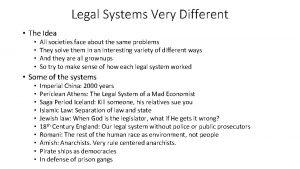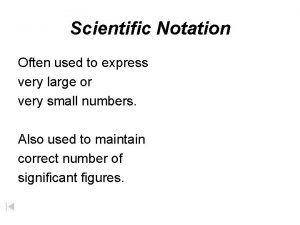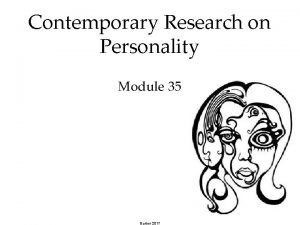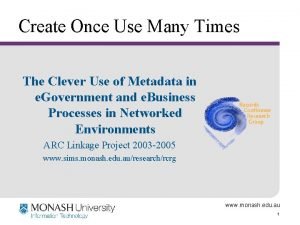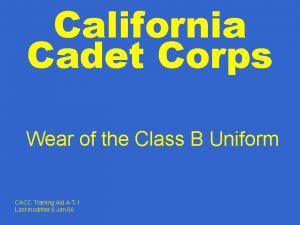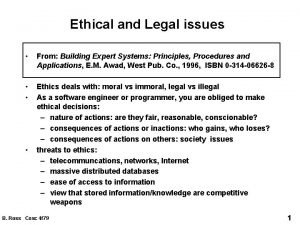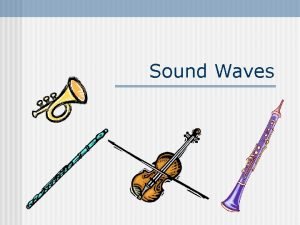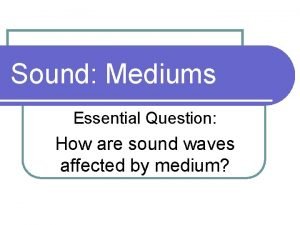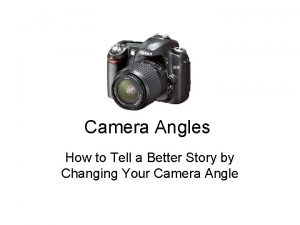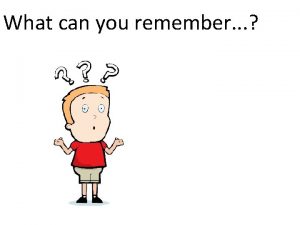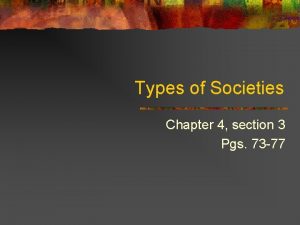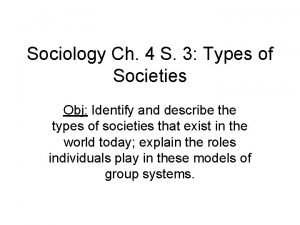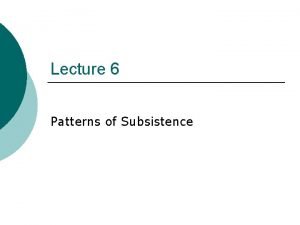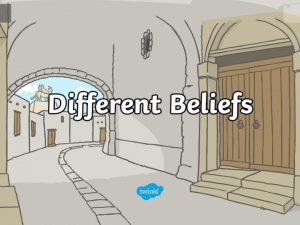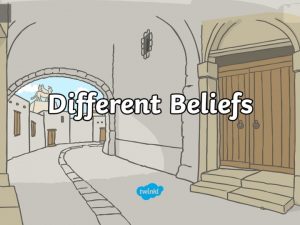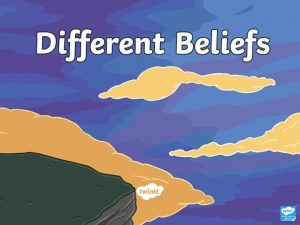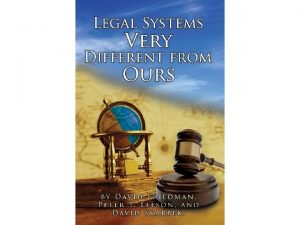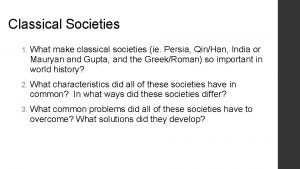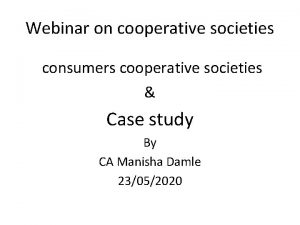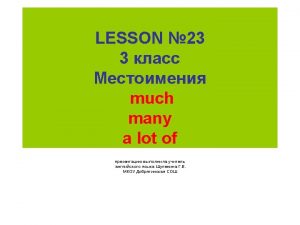Legal Systems Very Different Many societies many times











































- Slides: 43

Legal Systems Very Different • Many societies, many times and places –All have legal systems, broadly defined –All face about the same problems –Solve them in different ways • Learning about them is useful to –See if our approach works in general –Get ideas for ways we could do things –Get information about the consequences of doing things in different ways • Three examples in the book –Saga period Iceland: Pure tort – 18 th c. England: Privately prosecuted criminal –Current Shasta County: Norms instead of laws • Many more examples in my seminar

Iceland: History • Ninth c. , Harald Haarfagr unifies Norway – Not everyone likes the result; Iceland recently discovered – Load up your longships and go • Settlement starts 870, legal system 930 – Based on traditional norwegian law, but – No king – Hence no executive arm of government • First big problem c. 1000: Christian vs Pagan – Fewer than a dozen people killed, then – Settled by arbitration • C. 1200 level of violence starts increasing • 1263 -4 vote to turn the country over to the king of Norway.

Legal System • Go i: Mistranslated “chieftain” – Person who links farmer to legal system – “Whose godord are you in” equivalent to “what is your state citizenship” – Voluntary, non-geographical, competitive • Can be thingman of any Go i who will have you • And can freely change • Go ord: two meanings – Bundle of rights belonging to a Go I – Group of people who are his “clients. ” • Fixed number of them--about 40 – Transferable, marketable, heritable – Think of it as a franchise

Court system • Which court a case goes to – Determined by whose Go ord each party is in – Analogous to our diversity jurisdiction • Pure tort system – Prosecution by the victim – Verdict normally money damages – If the defendant loses and doesn’t pay – Plaintiff goes to court to have defendant outlawed – It is legal to kill an outlaw, tortious to defend him – In practice, outlaws normally leave Iceland

Problems • Poor victim – – If I don’t have friends or kin who will fight for me How do I keep defendant from forcibly blocking the suit How do I kill outlaw? Equivalent to our “if I can’t afford a lawyer” • Judgment proof defendant – If the defendant can’t pay the fine – Why bother to prosecute – And what good does winning do? • Stability of the system – What if losers just ignore the verdict – And their kin and friends fight for them?

Solutions • Poor victim – Tort claim is marketable – Can sell it to someone able to collect • Judgment proof defendant – Alternative of death or exile a strong incentive • Not to commit torts you can’t pay for and • To find some way of paying for them--borrow from kin – “Debt thralldom: ” work off the damage payment • Stability of the system – – – Defending an outlaw is tortious, so … Each fight that hurts people generates new cases Which the kin of the good guys win If damages not paid, the good guy coalition keeps growing Njal Saga anecdote

Other problems? • Gaming the legal system? – A good “lawyer” might find tricks--another Njalsaga story – but … –The other side can always abandon the case –Kill the defendant –And offer to let the wergelds cancel when it goes to court • Cost of finding out who the criminal is? –More severe punishment if you conceal the crime –Open killing is just killing –Secret killing is murder. Fewer defenses, shameful –Egilsaga story.

Conclusions • How well did it work? – Sagas show lots of violence--but – Until the final period, very small scale • Four of us attacked three of them • One person killed, two wounded – Most feuds seem to settle fairly quickly • Either by a court case, or … • Arbitration • The few that don’t are the ones that generate sagas – There was a final period of breakdown--after 250 years or so • • Perhaps the influence of a foreign ideology--kingship Or the king of Norway meddling Or Christianity->tithes->tax revenues for leaders to fight over Or increasing concentration of power, less competitive system • Contrast to the later conventional (royal) system – Transition from paganism to christianity: 5 -10 lives – Transition from Catholic to Lutheran: 40 -50

Lessons for us? • Marketable torts: Might be a good idea – – – If someone smashes your car and hurts you Can you afford a good lawyer? Contingency fee--but how do you choose a lawyer? With marketable torts, just auction off the claim Might also solve the class action problem • How do you make the class lawyer serve his “clients? ” • Let him buy up the claims from middlemen who collect them • He sues for himself, they get a market determined price • Workability of a pure tort system – With marketable torts and – Backup punishment for the judgment proof

England in the 18 th Century • On paper, our legal system – – Tort law, where the victim sues Criminal law, “Rex v Jones” But Rex doesn’t have a prosecutor Any Englishman can prosecute any crime • In practice, the victim usually prosecutes • Why does he bother? Can’t collect damages • Punishment at the extreme – Benefit of clergy: Clerics under church courts • • Which didn’t have a death penalty And definition of “cleric” pretty elastic And by 1600 the church no longer had much of a court system So a get out of jail card (once). Until … – All serious crimes became non-clergyable felonies • For which the only punishment in the law was • Hanging

Puzzles • What was the incentive to prosecute? – The victim pays the cost of the prosection – And the criminal, if convicted, gets hanged • Why no imprisonment for serious crime? – – – In practice, not nearly all criminals were hanged “Pious perjury”--jury finds guilty of lesser included offense Pardoning on condition of transportation Or enlisting in the army or navy, or. . Just pardon and send home Of those charged with non-clergyable felonies • About 40% convicted of them • About 40% of those hanged (by memory, not precise) • In one study of records from one court system – Why convict someone and then pardon him?

Incentive to prosecute • To be paid to drop the prosecution – “compounding a felony. ” Illegal … – Although encouraged for lesser offenses – And seems to have occurred for felonies • To deter felonies against the victim – Easy to see if he is a likely repeat victim • Who wants a reputation to deter offenders • “We prosecute shoplifters” signs today – And for more ordinary victims, they invented • • • The association for the prosecution of felons Thousands of them created over the period Potential victims in a town pay an annual fee To a fund to prosecute felonies committed against any member The membership list is printed in the newspaper for the felons to read Looks like insurance, actually a commitment strategy

Pattern of punishment • Imprisoning potentially violent criminals is expensive – – Can try penal slavery, but it may not pay its way History of galley slavery is instructive For Britain, transportation the next best thing. Or enlistment When transportation interrupted, experiment with penal slavery a loss • Experiment with large rewards as incentive to prosecute – For a few crimes, such as highway robbery – Perhaps where precommitment doesn’t work? – Generated a series of scandals • Entrap someone, convict, share out the reward, or… • Fake a crime with fake witnesses, collect the reward • “Perjured testimony for sale here”

Why Pardoning? • Price discrimination? – Some criminals easier to deter. – Scare then, don't hang them – So live to be productive taxpayers • Discriminate by value of the criminal’s life to others? – The more people try to persuade you to pardon him – The more likely it is that executing imposes external costs • Perhaps a market in favors – Earlier, the crown sold pardons – Now, perhaps political loyalty for the influence that got them – Boswell’s account is instructive • Unsuccessful attempt to get a pardon for a client • By appealing to all his influential friends • To use their influence to get it

Lessons for Us? • Deterrence can be made a private good – Useful in a pure tort system – For getting judgment proof offenders sued – Especially with a backup punishment for those who don’t pay • Tension between virtues of efficient punishment • And the risk of too much incentive to punish

Shasta County: Norms • The story – Coase says open range/closed range, same behavior – Shasta county a patchwork of open/closed – Ellickson went to look – Coase is correct in his prediction, but … – For an entirely different reason • The system: Norms of neighborly behavior – Privately enforced by mainly social sanctions – Violate the norms people don’t like you – One norm is that neighbors don’t sue neighbors • So for some issues formal law becomes irrelevant • Including damages due to straying cattle

Norm for Straying Cattle • If my cattle damage your crop – I am expected to be apologetic – If necessary help replant your tomatoes – Try to keep it from happening again • Enforcement – Social pressure. If that doesn’t work – Drive your cattle a few miles in the wrong direction – Let you find them if you can • But never the efficient punishment – – Ten cattle stray on my land--for the fifth time Convert one into beef in my freezer Call you to complain that nine of your cattle are on my land Why not?

Why use an inefficient punishment? • Victim is his own judge and jury – The punishment costs him as well as the owner of the cattle time and effort – If punishing is expensive, he only does it • When the offense is real • And he wants deterrence and is willing to pay for it – If punishing is profitable … • Which brings us back to the – Efficiency of inefficient punishment – As a way of not giving too large an incentive – To punish--even when punishment not justified • Lesson for us – The harder it is to keep the system honest – The more important to limit to costly punishments

Other systems: Athens • A government of amateurs – “Democracy” in which every official but the generals – Is chosen by lot • Private prosecution of crimes – Prosecutor gets a cut of the large fine – Obvious incentive to bogus prosecutions, but … – Fine or getting less than 1/5 of the jury to vote for guilt • “Liturgy” to produce public goods – If you are one of the richest Athenians – Every other year you are selected to produce a public good – Go get out of it, you must either • Show you already did such this year or last or • That there is a richer Athenian who didn’t – How, in a world without accountants, do you prove – Another Athenian is richer than you are? Offer to trade everything you own for everything he owns If he refuses, he has admitted to being richer than you are

Imperial China • Large population, small bureaurcracy – How do you rule it? – Subcontract the job to other structures – Most notably the extended family • We think it oppressive when – A political system tries to force – Children to spy on their parents • The Chinese made it illegal for – Children to accuse their parents – Even of crimes the parents had committed • Make involvement with the legal system dangerous – – Witnesses could be tortured, for instance So accusing someone else a good way of getting him in trouble? Anonymously, to keep yourself out of trouble For an official to read an anonymous accusation was a crime!

Cheyenne Indians: Llewellyn and Hoebel: The Cheyenne Way • • Some government part of the year A good deal of casual violence, but … Killing another Cheyenne a strict liability crime Exile for some years, because – You smell of death – Bad luck to associate with you • When someone breaks rules, smash his stuff – If he doesn't resist, acts as if he knows he is in the wrong – Gift him with replacements

Some general issues • Mechanisms for prosecuting include – State employees – Tort like system – Private deterrence in a criminal system • Mechanism for enforcement include – – State actors Private actor--Icelandic feud Community action--ostracism, social pressure Side effect of private action: Reputational enforcement • Incentive to enforce – You need enough, but … – Not too much

One Specific Issue • We have both tort law and criminal law • Doing about the same work – A does something bad to B – The legal system intervenes – Something bad is done to A – Which is a reason not to do bad things • Using different mechanisms – Tort: Claim belongs to, is prosecuted by, the victim – Criminal: Claim belongs to, is prosecuted by, the state • Is there a good reason to have both? – Iceland managed without criminal law – China without tort law • Is there a good reason to sort offenses as we do? – Why are some bad things considered crimes – Others torts. Others both • Are there good reasons why the legal rules of the two systems differ as they do?

Should we abolish the criminal law? – We know a legal system can work without it • Saga period Iceland a clear example • But would it be unworkable for us? • Or clearly inferior – What problems might require criminal system to deal with? • • Victim can’t afford a lawyer Diffuse injury with many small victims Judgment proof offender Efficient private system impossible? (L&P) – Can these be solved • For all sorts of cases • And what new problems might the solution raise

A doctor discovered a cure for which there was no disease He caught the cure and died

Some Problems • Poor victim: Can't afford to sue • Diffuse victims – Suppose my act hurts lots of people a little each – It isn't worth suing for what one of them can collect – And one suit doesn't produce a useful amount of deterrence: Public good problem for victims • Judgment proof defendant – If he can't pay the damages, why sue him? – And if he won't be sued, or won't pay if he is – No deterrence

Some Solutions • Poor victim: Make claim marketable • Diffuse victims – Either current class action, or … – Marketable claims plus – Middlemen to accumulate and rebundle • Buy all claims for less than $200 • From ten million people • Sell ten million claims for damages from X to entrepreneurial attorney • Judgment proof defendant – Tort backstopped by imprisonment+bounty – Tort with criminal penalty if you don’t pay – Tort with broader ways of collecting • Work it off: Penal slavery • Forfeit organs?

Landes&Posner Argument • Imagine a private enforcement system – – Firms buy claims from victims Catch, prosecute, sometimes convict Collect a fine Whose amount is set by the state • An efficient system imposes – The right level of expected punishment – Via the right combination of punishment and probability • But the fine set by the state is both – The reward to the enforcer, which determines • how hard he tries to catch offenders • Hence probability of being caught and convicted – And the punishment imposed – So you cannot, save by chance, find a fine that gives the right value of both p and P.

Solution • State sets <P>=p. P, not fine F – Private enforcement firm can – Catch lots of offenders, impose a low P – Catch few, impose a high P • Private firm wants to maximize profit – Punishment is measured by effect on offender • Firm’s revenue is what it can collect • Punishment cost is the difference – High p, low P, can collect fines--but spend lots catching criminals – Low p, high P more criminals can’t pay fine--but don’t need as many private cops – Precisely the tradeoff that went into calculating the optimal p, P pair a few chapters back • Enforcement cost+punishment cost are a subtraction from firm profit – So firm picks p, P to minimize the sum – Which means the efficient combination!

Negative Price Offenses • Suppose, at the optimal p, P, it costs – – More, on average, to catch and convict Than you can collect from the convicted offender The value to the enforcer of the right to impose p, P is negative So the enforcer will “buy” offenses only at a negative price • Solution: Deterrence as a private good –“Sell” offenses against you in advance –Notify potential offenders that you have done so –I. e. pay enforcement firm to agree to catch and punish those who offend against you –Thus buying deterrence –Problem –What if the potential offender can’t find out –If the potential victim has precommitted –“Anonymous victim” offenses –Such as the judgment proof dangerous driver

So the private system • Can work for offenders who can pay – Enough to make it worth catching them – As with the current tort system • Can work for offenders who cannot, if … – Deterrence can be made a private good – I. e. offenders know if victim is pre-committed • For judgment proof offenders+anonymous victims – Works poorly unless backstopped by • Bounty+criminal punishment • Organ forfeiture … • But “works poorly for a subset of offenses” – Might still be better than the criminal law alternative – Since no good mechanism to make it choose to be efficient

Sorting offenses – L&P: Torts are offenses easy to detect • So p always about 1 • So their p, P problem with private enforcement vanishes – But tort damages are the reward for winning the case • So are the incentive to spend money litigating – Why should the optimal incentive to litigate – Equal the optimal fine to the loser • So their problem reappears – Implies that the tort system cannot be efficient for torts!

Criminal law for the judgment proof? • Tort law for offenses likely to sell for a positive price • Criminal law for negative price offenses – Due to being costly to catch and prosecute – And/or requiring very large punishments – And/or committed by offenders with few assets • But note that negative price torts unlikely to be litigated under present arrangements – So we are observing a biased sample of torts – Which may make this explanation look better than it is

Further issues • On the other hand – – Torts are often accidents, and accidents Are anonymous victim offenses Which makes it harder to use private enforcement So perhaps we have it backwards! • False conviction problem – – – Private enforcement via positive price offenses Requires that conviction is profitable Which raises risk of fraudulent conviction Back to the efficiency of inefficient punishments So perhaps criminal law should be for • Offenses it is easy to frame people for? • But that has its own risks--framing by the state • Is this why tort law doesn’t include probability multipliers? – “Make the victim whole” means he cannot gain by being a victim – Which eliminates one class of frauds – Where the damage is real, but arranged by the victim

Bundling legal rules Characteristic Tort Crime Who Controls Prosecution Victim State Who Collects Punishments Victim State Fine Imprisonment, Execution Preponderance of the evidence Beyond a Reasonable Doubt Probability Multiplier? No Yes Right to Jury Trial? Maybe Yes Desired level of offenses >0 =0 Requires intent No Yes Stigma to Conviction No Yes Form of Punishment Standard of Proof

Does it make sense? • Same actor controls prosecution, collects fines – Fine provides an incentive to prosecute • Which can be a feature, or … • A bug--too much incentive, bogus prosecutions • Consider the recent Duke case – Also, if the two are separate • Controller can settle out of court • And so steal the fine from collector • Victim as owner/prosecutor in tort – Combines deterrence and fine incentives – But the victim is often the chief witness • • And his evidence becomes less credible The more he has to gain by conviction Old problem with rewards in 18 th c. England Current with testimony in exchange for lenient treatment

Punishments • Tort uses efficient, criminal inefficient – Makes sense in terms of incentive to prosecute – Efficient punishment makes it more likely • That the enforcer collects enough • To pay the cost of enforcement • Making it a positive price offense • Higher standard of proof in criminal – – – Fits the use of less efficient punishments But … efficient punishments give risk of fraud Problem when the enforcer pockets the fine And when the standard of proof is low I. e. tort law

Probability multipliers? • In criminal but not tort system – Tort rule: Make the victim whole – Criminal punishment can be >> damage done • Because? – – Probability higher in tort, less need for a multiplier? But arguably private needs multiplier for incentive But … high punishment harder to collect And multiplier->risk of fraud • Arguably a problem with punitive damages • And class actions today • Are there efficient offenses? – Tort, often, so use Pigouvian rule to control – Criminal, intentional • • • So could choose not to commit Could buy the car instead of stealing it Makes it more likely that we want to deter all offenses If doing so doesn’t cost us too much Which is an argument for higher punishments--not just probability multiplier

Other differences • Intent – Intentional more likely to be concealed • So costly apprehension, lower p • Both arguments for criminal – Intentional more likely to have market substitute • Hence the crime version less likely to be efficient • So don’t need Pigouvian rule to limit punishment • Right to a jury trial – Criminal in the Anglo-American system – Civil also only in the U. S. – Perhaps because in a criminal trial • Everyone but the victim is a state employee • Raising the risk of a corrupt system • If you don’t have a jury to limit state power

Stigma • Criminal conviction gives stigma, tort usually does not – Stigma does not provide an incentive to prosecute • Since the gain goes to other people using the information • Not, like a fine, to the prosecutor – Does provide a substitute for expensive punishments – Private prosecutor has an incentive to • Out of court settlement with facts kept secret • I. e. accept bribe from defendant to suppress stigma • Since its benefit goes to other people • Makes sense if the law can control stigma – – But if stigma consists of individuals using information In their own interest It is the nature of the information that determines stigma Does it imply that associating with the offender is costly?

Victim’s incentives • Tort compensates the victim – Which reduces his incentive not to be a victim – Which might be a feature or a bug – What we want is the right (efficient) level of incentive • Efficient incentive means that – Victim’s gain from acts to prevent offense – Equals net social gain – Buys prevention if and only if worth the cost

World of Costless Enforcement • To focus on just that issue, imagine – That offenders are caught and punished at 0 cost – Steal my car? Caught, pay the car’s value • To me under a tort system • To the state under a criminal system • How hard should I try to protect my car? – Not at all. • You only steal if the car is worth more to you • In which case it is efficient – Just as the grocery store shouldn’t glue the groceries to the shelf – So tort system gives the right incentive, criminal wrong • How careful should I be not to be run into by a drunk driver? – Here my loss isn’t his gain – So an incentive for me to prevent it is useful – Which we get with criminal but not with tort • At least in that world, theft should be a tort, auto accidents criminal! – If we consider only the one issue – Of the victim’s incentive to prevent the offense

The point being • That the tort/crime choice affects – Many things relevant to sorting offenses • Some of which may be reasons to make X a tort • Others reasons to make it a crime – Many things relevant to sorting rules • Some of which may be reasons why a rule should be associated with (say) tort law • And others why it should not be • Making this a hard problem
 Legal systems very different from ours
Legal systems very different from ours Ib environmental systems html
Ib environmental systems html 15 times 15 times 20
15 times 15 times 20 Figure 10
Figure 10 Used to express very large or very small numbers
Used to express very large or very small numbers Very little or very few
Very little or very few Receiving table/area
Receiving table/area Very little food
Very little food Pictures of shadows at different times of the day
Pictures of shadows at different times of the day Www.youtube.com
Www.youtube.com Ashley began her banking career as a teller
Ashley began her banking career as a teller Moon compared to earth
Moon compared to earth Create once use many times
Create once use many times A rope is wrapped many times around a drum of radius 50 cm
A rope is wrapped many times around a drum of radius 50 cm California cadet corps class b uniform
California cadet corps class b uniform Thermoplastics can be heated and shaped many times
Thermoplastics can be heated and shaped many times Moulting in silkworm
Moulting in silkworm I have studied many times the marble
I have studied many times the marble How many times
How many times Sawaraj flag
Sawaraj flag The exponent indicates how many times
The exponent indicates how many times How many times challenge
How many times challenge Bob dylan blowin' in the wind
Bob dylan blowin' in the wind Legal expert systems
Legal expert systems Why do different polymers have different properties
Why do different polymers have different properties Technicolor test
Technicolor test Sound will travel at different speeds in different mediums.
Sound will travel at different speeds in different mediums. Library.thinkquest.org 19537
Library.thinkquest.org 19537 Different culture have different moral codes
Different culture have different moral codes Different angle different story
Different angle different story Acids and bases have two different faces
Acids and bases have two different faces Manufactured boards examples
Manufactured boards examples No two people
No two people Venn diagram different same different
Venn diagram different same different History helps us understand ourselves
History helps us understand ourselves Characteristic
Characteristic Simple horticultural societies
Simple horticultural societies Subsists primarily by raising animals
Subsists primarily by raising animals Pastoral society characteristics
Pastoral society characteristics Chapter 31 societies at crossroads
Chapter 31 societies at crossroads Pre-literate society examples
Pre-literate society examples Simple horticultural societies
Simple horticultural societies Restraint indulgence
Restraint indulgence North korea dystopian society
North korea dystopian society
